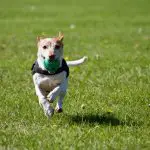Rottweiler puppy and dog information
The Rottweiler is a muscular, highly protective dog that is a favorite for police and the military. They have a reputation as a dog not to fool with and they strike fear in the bad guys. They need to be extensively socialized to get along with other pets and other dogs. They can get along well with children if they are older. As a reminder, never leave a child unsupervised with a puppy or dog. They can do well with a fenced yard for exercise but they expect plenty of family time.
*Approximate Adult Size. The approximate adult size (two years old or older) of the male Rottweiler is 24 to 27 inches to the withers (highest point of the shoulder) and 95 to 130 pounds. The female ranges from 22 to 25 inches to the withers and 85 to 115 pounds.
*Special Health Considerations. Most dog breeds have certain inherited health problems associated with that specific breed and the Rottweiler is no exception. Be on the look out for Parvo, eye problems, progressive spinal cord disorder, Canine Hip Dysplasia (genetic based looseness in the hip joint that can lead to arthritis pain and lameness), and bloat (Gastric Dilation-Volvulus, the second leading killer of dogs, can kill within the hour, this space is too limited for a complete explanation but you should read up on this). Feeding more then once a day and avoiding exercise right after meals may help guard against bloat. This disease list is an informative guideline only. Other diseases may also be significant threats, please contact your veterinarian for a complete list.
She should visit the veterinarian several times in the first year for shots, boosters and check up. Then, as an adult, she should visit the veterinarian yearly for shots and check up. As she gets older, six years and on, she should visit the veterinarian twice a year for check ups and shots. Remember; avoid feeding your dog sweets.
*Grooming. The Rottweiler has a double coat. The outer coat is medium length, flat, dense, coarse and straight. The inner coat is thick or thin depending upon climate. She should be brushed regularly. Brushing will help her maintain a clean and healthy coat, help you keep a closer eye on her health and strengthen your emotional bond with her.
Her teeth should be brushed at least twice a week with toothpaste and toothbrush designed for dogs. Brushing removes the accumulation of plaque and tartar which can cause cavities (rarely) and periodontal disease. Dog periodontal disease can lead to pain, loss of teeth, bad breath and other serious disease.
Her toenails may need to be examined for growth and clipped regularly. The toenails of the rear feet grow slower than the toenails of the front feet.
*Life Span. The Rottweiler can live between 8 and 9 years with proper nutrition, medical care and excellent living conditions.
*History. The Rottweiler comes from Germany where they were used for control livestock. They evolved into being used for guard dogs, military and police dogs. They were first registered by the American Kennel Association in 1931.
Some Registries: *American Rottweiler Club *UKC United Kennel Club *NKC National Kennel Club *CKC Continental Kennel Club *APRI Americas Pet Registry Inc. *AKC American Kennel Club *FCI Federation Cynologique Internationale *NZKC New Zealand Kennel Club *KCGB = Kennel Club of Great Britain *ANKC = Australian National Kennel Club *ACR = American Canine Registry
Litter Size: 4 to 10 Rottweiler puppies
Category: Working Group
Terms To Describe: Powerful, robust, endurance, strength, agility, calm, courageous, confident, aloof, guardian, protective
*SPECIAL GOOD POINTS Very good watch dog. Very good guard dog.
*SPECIAL BAD POINTS Tends to snore. Tends to over eat. Needs strong obedience training early.
*Other Names Known By: Butchers Dog, Metzgerhund, Rottie
*Every dog is an individual so not everything in this information may be correct for your dog. This information is meant as a good faith guideline only.


